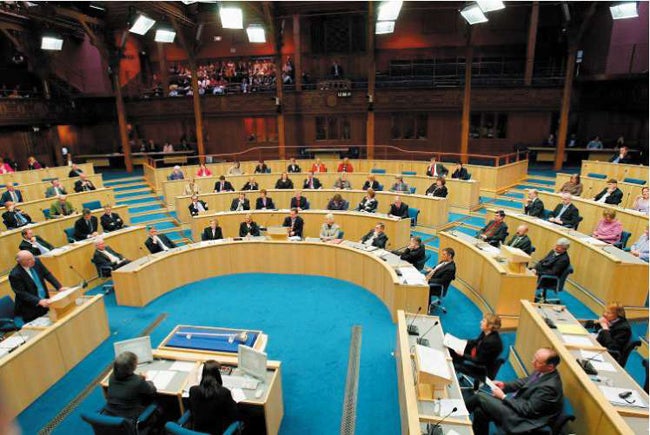The Regions: Scotland
Labour faces pincer of Nationalists and Conservatives

Your support helps us to tell the story
From reproductive rights to climate change to Big Tech, The Independent is on the ground when the story is developing. Whether it's investigating the financials of Elon Musk's pro-Trump PAC or producing our latest documentary, 'The A Word', which shines a light on the American women fighting for reproductive rights, we know how important it is to parse out the facts from the messaging.
At such a critical moment in US history, we need reporters on the ground. Your donation allows us to keep sending journalists to speak to both sides of the story.
The Independent is trusted by Americans across the entire political spectrum. And unlike many other quality news outlets, we choose not to lock Americans out of our reporting and analysis with paywalls. We believe quality journalism should be available to everyone, paid for by those who can afford it.
Your support makes all the difference.Under its first pro-independence Scottish National Party administration in Holyrood, the 2010 elections in Scotland present an intriguing case. Though the east is likely to remain a Labour bastion, the party is wavering under the challenges of devolution, the expenses scandal and a vertiginous decline in finances. In more than 20 seats in the north and east, Labour is now vulnerable to further incursions by the well-established SNP and a Conservative Party desperate to expand beyond its traditional English heartlands.
The SNP made national headlines in summer 2008 when it overturned Labour's third-largest majority in Scotland to win the Glasgow East by-election by 365 votes. No doubt this coup led to SNP leader Alex Salmond's bullish claim that his party would pick up 20 seats in the next UK election – a target that now looks implausible considering their opinion poll figures have stalled at around 21 per cent.
The SNP's domestic gains are unlikely to be reflected in the general election says Dr Nicola McEwen, co-director of the Institute of Governance at the University of Edinburgh. "Their pledge to win 20 seats is an ambitious forecast to make them seem relevant for these elections," she said. "There's so much focus on the battle between Labour and Conservatives there's a risk they can be crowded out."
Private Conservative polling indicates that 75 per cent of Scots believe the SNP to be an ineffective force in Westminster. However, the distinct prospect of a hung parliament could give smaller parties disproportionate influence if co-opted into a coalition, be it under the Conservatives or Labour. With this pitch, the SNP will try to persuade Scottish voters they present a legitimate alternative.
The SNP currently holds only seven seats in the north and east, and are likely to pick off a couple more. Ochil and South Perthshire is their primary target as they trail Labour by only 688 votes but it's a three-way battle and they will face a strong challenge from the third-placed Conservatives. Kilmarnock is also a priority, as is Dundee West and the four-way battle over the Liberal Democrats' Argyll and Bute.
The Conservatives face a daunting challenge to improve on the solitary seat they won in 2005: Dumfriesshire, Clydesdale and Tweeddale. However, their strong finances at both local and national level, and the paucity of their rivals' war chests have raised hopes at CCHQ, as have several damaging Labour expenses revelations. Polls put the Tories as high as 21 per cent, their highest for decades, and the party has made it clear it is determined to make inroads into marginals in the more affluent centre and south-east.
A special target to emerge is Perth and North Perthshire, a former Tory stronghold where party leader David Cameron has personally campaigned for local candidate Peter Lyburn. He has to overturn a slim SNP majority of 1,521 – a swing of 1.65 per cent.
CCHQ also has high hopes for Dr Neil Hudson, a strong contender for the three-way battle in Edinburgh South, the former seat of the disgraced former junior minister and close Brown ally Nigel Griffiths.
Join our commenting forum
Join thought-provoking conversations, follow other Independent readers and see their replies
Comments